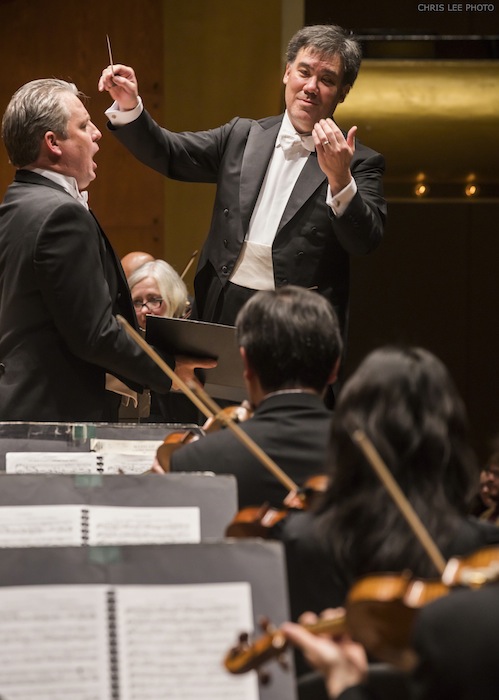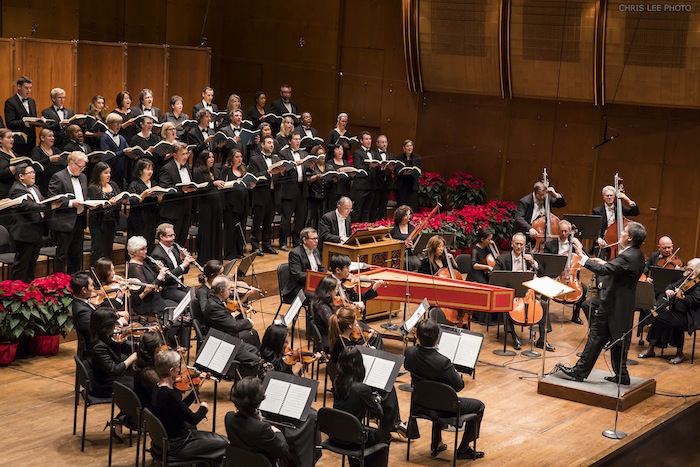With a superb quartet, Philharmonic delivers a lively and glowing “Messiah”

Alan Gilbert conducts Handel’s “Messiah” with the New York Philharmonic and soloist Matthew Polenzani Tuesday night at Geffen Hall. Photo; Chris Lee
As Christmas nears, Handel’s Messiah is the go-to staple in the classical music world, and there are more than a half-dozen different ensembles performing the piece this December. It was the New York Philharmonic’s turn Tuesday, and the lively, good-natured musicality displayed at David Geffen Hall belied any sense of holiday routine.
The reasons for this success were no secret. Obviously, the Philharmonic is an excellent orchestra with an excellent conductor, Alan Gilbert, on the podium. And they were assisted by the terrific Concert Chorale of New York, directed by James Bagwell. All of these musicians supported four top-flight vocal soloists; soprano Christina Landshamer, making her Philharmonic debut, mezzo Sasha Cooke, tenor Matthew Polenzani, and bass-baritone John Relyea.
A superb quartet on paper, they made for a super group in performance. Handel and librettist Charles Jennens created different styles of passages for the men and women soloists; the music for the women tends to be that of the angels, narrating the glories of the birth of Christ, while the men announce and proclaim. Capturing this contrast, Landshamer and Cooke sang with cool, graceful beauty, while Polenzani and Relyea were often intensely dramatic and characterful.
Cooke was particularly fine. Her creamy voice was luminous, even as it still hints at the riches of a contralto sound. Relyea was commanding, singing with a huge voice that seemed to strain the dimensions of the hall. Polenzani is an elegant singer, and he brought a sense of vigor to his tenor part not usually heard in this piece. Compared to all of these, Landshamer had relatively less power and charisma, but there was nothing to complain about her bright sound and lyrical phrasing.

Photo: Chris Lee
Gilbert’s interpretation was of the contemporary moment. The Philharmonic is a modern orchestra, of course, but the strings played without vibrato. Even if Gilbert’s tempos were slower than what, say, Roger Norrington might have indicated, there was an overall crispness to his leadership that brought the performance in ten minutes under the two and a half hours predicted in the program. He did this through a judicious balance of a quick, but never hasty, pace in the Sinfonias and fugues, while giving the vocal soloists and the chorus enough time to handle both their breathing and their ornamented passages.
The chorus sang with a soft, full, transparent sound and real energy. There was a dip in the performance after intermission, with a sluggish feeling in the opening Part II of “Behold the Lamb of God” and the mezzo Air “He was despised.” But with the dotted orchestral rhythms and robust choral singing in “Surely, he hath borne our griefs,” the forward motion picked up again, and the performance loped smoothly all the way through the end.
At the “Hallelujah” chorus, the bulk of the audience stood, even though it was likely none could tell you exactly why, other than people have been standing for the chorus for a long time. That kind of empty tradition is the potential pitfall of performances like this, that the Messiah is played because it has always been played.
But the score remain popular not just because of holiday tradition, but because it is a delightful work, full of well-made music that sticks in the memory for all of one’s life: “O thou that tellest good tidings to Zion,” “Ev’ry valley,” “For unto us a child is born,” “He shall feed his flock,” are gorgeous and satisfying, of a piece with Handel’s brilliance. Adept, sincere performances like this one refresh the pleasures of the music and still provide a fully meaningful experience.